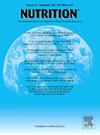运动诱导的体重减轻调节中年肥胖大鼠的脑铁和Omega-3脂肪酸代谢
IF 3.2
3区 医学
Q2 NUTRITION & DIETETICS
引用次数: 0
摘要
目的中年是肥胖和认知能力下降的关键时期,这通常与铁和omega-3长链多不饱和脂肪酸(LCPUFAs)的紊乱有关。目的是研究跑步机运动对脑铁和LCPUFA代谢的影响。方法分别饲喂对照组和50%高脂饲料(HFD),加铁和不加铁(2 g铁/kg), 8周诱导代谢异常铁超载综合征(DIOS)。随后是4周的低热量饮食和跑步机有氧运动(3千卡/克饮食,9.4%脂肪,37毫克铁/公斤饮食),以及1周的行为测试。采用超高效液相色谱-质谱法(UPLC-MS)测定海马LCPUFA谱。结果:食用HFD显著降低海马omega-3 LCPUFAs, DIOS组在运动干预后进一步降低(p为趋势<;0.001)。Western blot分析显示,运动/低热量饮食介导的减肥通过增强参与铁外排(铁转运蛋白)、LCPUFA生物生成(去饱和酶和延长酶)、磷脂重塑(酰基辅酶A合成酶长链家族成员和溶血磷脂酰胆碱酰基转移酶)和神经营养因子(脑源性神经营养因子)的蛋白质,同时减少β-淀粉样蛋白(所有p <;0.05)。干预恢复了认知功能,尽管这种效果在没有DIOS的中年肥胖大鼠中更为明显。这些发现表明,虽然运动引起的体重减轻有助于大脑健康,但可能需要额外的策略来解决DIOS中与铁相关的挑战,以获得最佳的认知结果。本文章由计算机程序翻译,如有差异,请以英文原文为准。

Exercise-induced weight loss modulates brain iron and Omega-3 fatty acid metabolism in middle-aged obese rats
Objectives
Midlife is a critical period for the onset of obesity and cognitive decline, which are often linked to disorders of iron and omega-3 long-chain polyunsaturated fatty acids (LCPUFAs). The aim was to investigate the effects of treadmill exercise on brain iron and LCPUFA metabolism.
Methods
Middle-aged male rats were fed either a control diet or a 50% high-fat diet (HFD), with or without iron enrichment (2 g ferric iron/kg diet), for 8 weeks to induce dysmetabolic iron overload syndrome (DIOS). This was followed by 4 weeks of a hypocaloric diet and treadmill aerobic exercise (3 kcal/g of diet, 9.4% fat, 37 mg iron/kg of diet), and 1 week of behavioral testing. Hippocampal LCPUFA profiles were measured using ultra-performance liquid chromatography-mass spectrometry (UPLC-MS).
Results
Consumption of an HFD significantly reduced hippocampal omega-3 LCPUFAs, with a further reduction in the DIOS group following the exercise intervention (p for trend < 0.001). A Western blot analysis showed that exercise/hypocaloric diet-mediated weight loss restored brain iron and LCPUFA metabolism by enhancing proteins involved in iron efflux (ferroportin), LCPUFA biogenesis (desaturases and elongase), phospholipid remodeling (acyl-CoA synthase long-chain family member and lysophosphatidyl choline acyltransferase), and neurotrophins (brain-derived neuro trophic factor), while reducing β-amyloid (all p < 0.05). The intervention restored cognitive function, although this effect was more pronounced in middle-aged obese rats without DIOS.
Conclusions
These findings suggest that while exercise-induced weight loss supports brain health, additional strategies may be needed to address iron-related challenges in DIOS for optimal cognitive outcomes.
求助全文
通过发布文献求助,成功后即可免费获取论文全文。
去求助
来源期刊

Nutrition
医学-营养学
CiteScore
7.80
自引率
2.30%
发文量
300
审稿时长
60 days
期刊介绍:
Nutrition has an open access mirror journal Nutrition: X, sharing the same aims and scope, editorial team, submission system and rigorous peer review.
Founded by Michael M. Meguid in the early 1980''s, Nutrition presents advances in nutrition research and science, informs its readers on new and advancing technologies and data in clinical nutrition practice, encourages the application of outcomes research and meta-analyses to problems in patient-related nutrition; and seeks to help clarify and set the research, policy and practice agenda for nutrition science to enhance human well-being in the years ahead.
 求助内容:
求助内容: 应助结果提醒方式:
应助结果提醒方式:


